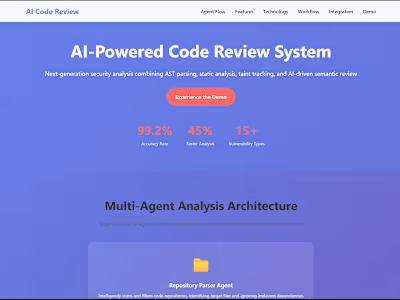AI-Driven Automated Test Generation System
🎯 Project Overview
Revolutionary approach to automated test generation using AI agents
Current automated test generation tools focus primarily on code coverage and lack:
Business logic understanding
Security vulnerability testing
Semantic context awareness
Multi-layered validation
An agentic AI system that combines multiple specialized agents to generate comprehensive test suites:
Multi-agent architecture
LLM-powered semantic analysis
🏗️ Multi-Agent Architecture
Specialized agents working together for comprehensive test generation
Main coordinator that orchestrates all agents and manages the overall workflow
Agent coordination
Workflow management
Result aggregation
Quality metrics tracking
AST-based function extraction
AI-powered scenario generation
Realistic test data creation
Framework-specific code generation
Edge case identification
Comprehensive capabilities for modern test generation
Test Type Description Use Case UNIT Basic unit tests All functions INTEGRATION Integration tests Functions with dependencies EDGE_CASE Boundary condition tests Complex functions SECURITY Security-focused tests Security-sensitive functions PERFORMANCE Performance tests Performance-critical functions ERROR_HANDLING Exception handling tests Functions with error handling
pytest (recommended)
unittest (built-in)
Custom framework adapters
CRITICAL: Security-sensitive, high-risk functions
HIGH: Complex functions with dependencies
🛠️ Installation & Setup
Get started with the agentic AI test generation system
Prerequisites: Python 3.7+ is required for this system to work properly.
📦 Required Dependencies
🔧 Installation Steps
🔑 API Configuration
Note: You'll need a Google Gemini API key for AI-powered features. The system will work without it but with reduced semantic understanding capabilities.
Learn how to generate intelligent test suites
💻 Command Line Interface
Complete API documentation for all system components
Class Description Key Properties FunctionInfo Function metadata and analysis name, parameters, return_type, complexity TestCase Generated test case representation name, type, code, priority, quality_score TestResult Test generation results source_file, test_cases, coverage, metrics GenerationReport Comprehensive generation summary total_tests, coverage_achieved, quality_metrics
💡 Real-World Examples
Practical examples demonstrating the system's capabilities
📊 Example 1: E-commerce Discount Calculator
🔒 Example 2: Security-Focused Authentication
✨ AI Analysis Results: The system identified this as a security-critical function and automatically generated tests for common attack vectors including SQL injection, timing attacks, and edge cases with unicode characters.
Comprehensive metrics to evaluate test quality and coverage
Line Coverage: Percentage of code lines executed
Function Coverage: Percentage of functions tested
Problem: "Invalid API key" or authentication errors
Verify your Gemini API key is correct
Check that the API key has proper permissions
Ensure the .env file is in the correct directory
Problem: Tests not generating or poor quality output
💡 Pro Tip: Enable verbose logging by setting the environment variable
LOG_LEVEL=DEBUG to get detailed information about the generation process.Like this project
Posted Jul 9, 2025
AI-driven multi-agent Python test generator: AST analysis, risk-based tests, security checks, LLM semantics, realistic mocks—boosts coverage & quality.
Likes
1
Views
0
Timeline
Jul 6, 2025 - Jul 7, 2025





